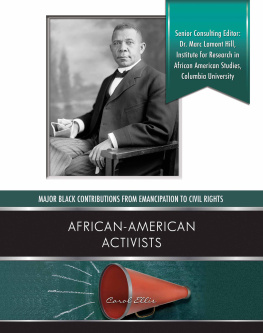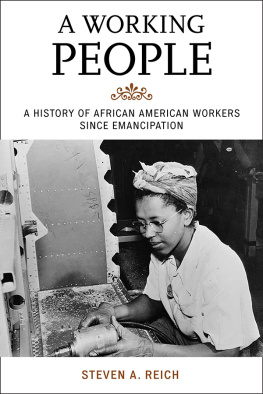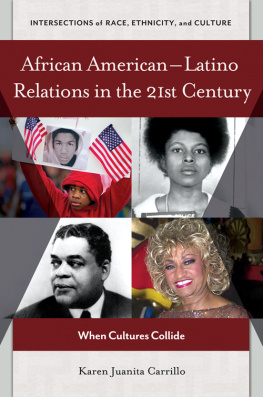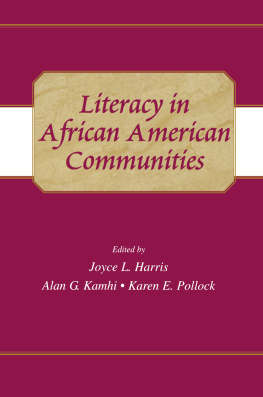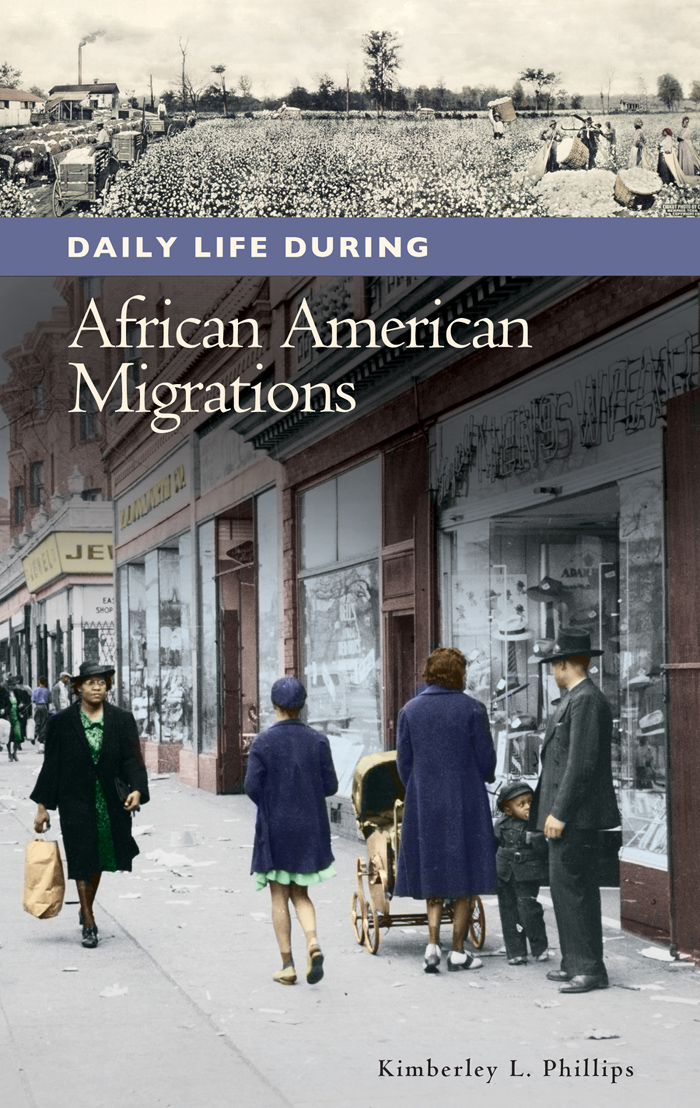KIMBERLEY L. PHILLIPS is professor of History and Dean of the School of Humanities and Social Sciences, Brooklyn College-CUNY. She was recently the Frances L. and Edwin L. Cummings Associate Professor of History and American Studies at the College of William and Mary. Her scholarship includes AlabamaNorth: African-American Migrants, Community, and Working-Class Activism in Cleveland, 19151945 (1999) and War! What Is It Good For?: Black Freedom Struggles and the U.S. Military from World War II to Iraq (2012).
DAILY LIFE DURING AFRICAN AMERICAN MIGRATIONS
KIMBERLEY L. PHILLIPS

Copyright 2012 by Kimberley L. Phillips
All rights reserved. No part of this publication may be reproduced, stored in a retrieval system, or transmitted, in any form or by any means, electronic, mechanical, photocopying, recording, or otherwise, except for the inclusion of brief quotations in a review, without prior permission in writing from the publisher.
Library of Congress Cataloging-in-Publication Data
Phillips, Kimberley L. (Kimberley Louise), 1960
Daily life during African American migrations / Kimberley L. Phillips.
p. cm. (The Greenwood Press daily life through history series)
Includes bibliographical references and index.
ISBN 978-0-313-34373-5 (acid-free paper) ISBN 978-0-313-34374-2 (ebook) 1. African AmericansMigrationsHistory. 2. African AmericansSocial life and customs. 3. African AmericansSocial conditions. 4. African diasporaHistory. 5. Migration, InternalUnited StatesHistory. 6. Migration, InternalSocial aspectsUnited StatesHistory. 7. United StatesEmigration and immigrationHistory. 8. United StatesRace relationsHistory. I. Title.
E185.P44 2012
304.80896073dc23 2011051652
ISBN: 978-0-313-34373-5
EISBN: 978-0-313-34374-2
16 15 14 13 12 1 2 3 4 5
This book is also available on the World Wide Web as an eBook.
Visit www.abc-clio.com for details.
Greenwood
An Imprint of ABC-CLIO, LLC
ABC-CLIO, LLC
130 Cremona Drive, P.O. Box 1911
Santa Barbara, California 93116-1911
This book is printed on acid-free paper
Manufactured in the United States of America
Recent Titles in The Greenwood Press Daily Life Through History Series
Elizabethan England, Second Edition
Jeffrey L. Forgeng
The New Americans: Immigration since 1965
Christoph Strobel
The New Inuit
Pamela R. Stern
The Indian Wars
Clarissa W. Confer
The Reformation
James M. Anderson
The Aztecs, Second Edition
Davd Carrasco and Scott Sessions
The Progressive Era
Steven L. Piott
Women during the Civil Rights Era
Danelle Moon
Colonial Latin America
Ann Jefferson and Paul Lokken
The Ottoman Empire
Mehrdad Kia
Pirates
David F. Marley
Arab Americans in the 21st Century
Anan Ameri and Holly Arida, Editors
Chronology
18611865 American Civil War
1862 President Lincoln issues preliminary Emancipation Proclamation, effective January 1, 1863, freeing slaves in states in rebellion against the United States
1865 General William T. Sherman issues Field Order 15 and orders up to 40 acres to be given to each African American household; Thirteenth Amendment passed; Freedmens Bureau established; Ku Klux Klan organized in Tennessee
18661870 Congress passes Civil Rights Act that establishes birthright citizenship; Congress passes First Reconstruction Act, granting suffrage to African American men in former Confederate states; Congress passes and states ratify the Fourteenth Amendment, which grants African Americans equal citizenship and civil rights; Congress passes and states ratify the Fifteenth Amendment, prohibiting bans of male voting based on race
1867 Federal troops occupy former Confederate states
1875 Congress passes Civil Rights Act of 1875
1877 Last of federal troops leave the South and Reconstruction officially ends
1878 Thousands of African Americans depart Deep South states for Kansas
1883 Supreme Court overturns Civil Rights Act of 1875
1890 Mississippi becomes first state to enact legislation that limits the franchise, which sets precedent for other laws to limit voting
1895 Ida B. Wells-Barnett writes A Red Record
1896 Supreme Court establishes separate but equal doctrine in Plessy v. Ferguson, which established base for legal state-mandated racial segregation
19051909Chicago Defender is first published in 1905 by Robert S. Abbott; the Pittsburgh Courier is published in 1907 by Edwin Harleston; and the New York Amsterdam News is published by James Henry Anderson in 1909
1909 National Association for the Advancement of Colored People (NAACP) is founded in New York City
1910 Great Migration begins
19141918 World War I; United States enters war in 1917
1914 Fellowship of Reconciliation organized by A. J. Muste
1916 Marcus Garvey, an immigrant from Jamaica, establishes the Universal Negro Improvement Association (UNIA)
19171923 Riots erupt in northern and Upper South cities, including East St. Louis, Chicago, and Tulsa
19221933 Harlem Renaissance
19221941 African American workers and civil rights activists organize boycotts known as Dont Buy Where You Cant Work to end employment discrimination in northern cities
1930 Great Depression begins; Great Migration ends; W. D. Fard organizes the Nation of Islam in Detroit
19391945 World War II; United States enters war in 1941 after Japan bombs Pearl Harbor
1941 Second Great Migration begins
Labor and civil rights activist A. Philip Randolph organizes March on Washington Movement to end segregation in the military and employment discrimination in war industries
19421943 Hundreds of race riots occur in cities, workplaces, and military bases
1943 Congress of Racial Equality (CORE), founded in Chicago by James L. Farmer, George Houser, Bernice Fisher, and James R. Robinson (Bayard Rustin becomes critical participant), organizes its first successful sit-in
19431965 In cities across the United States, African Americans organize boycotts, marches, and demonstrations against discrimination in housing, employment, and public accommodations
19461948 Supreme Court bans segregation in interstate busing Morgan v. Virginia (1946) and bans racially restrictive covenants in Shelley v. Kramer (1948)
1953 Malcolm Little joins the Nation of Islam and changes his name to Malcolm X
1954 Supreme Court declares segregated public schools unconstitutional in Brown v. Board of Education, which challenges, but does not technically overturn Plessy v. Ferguson


